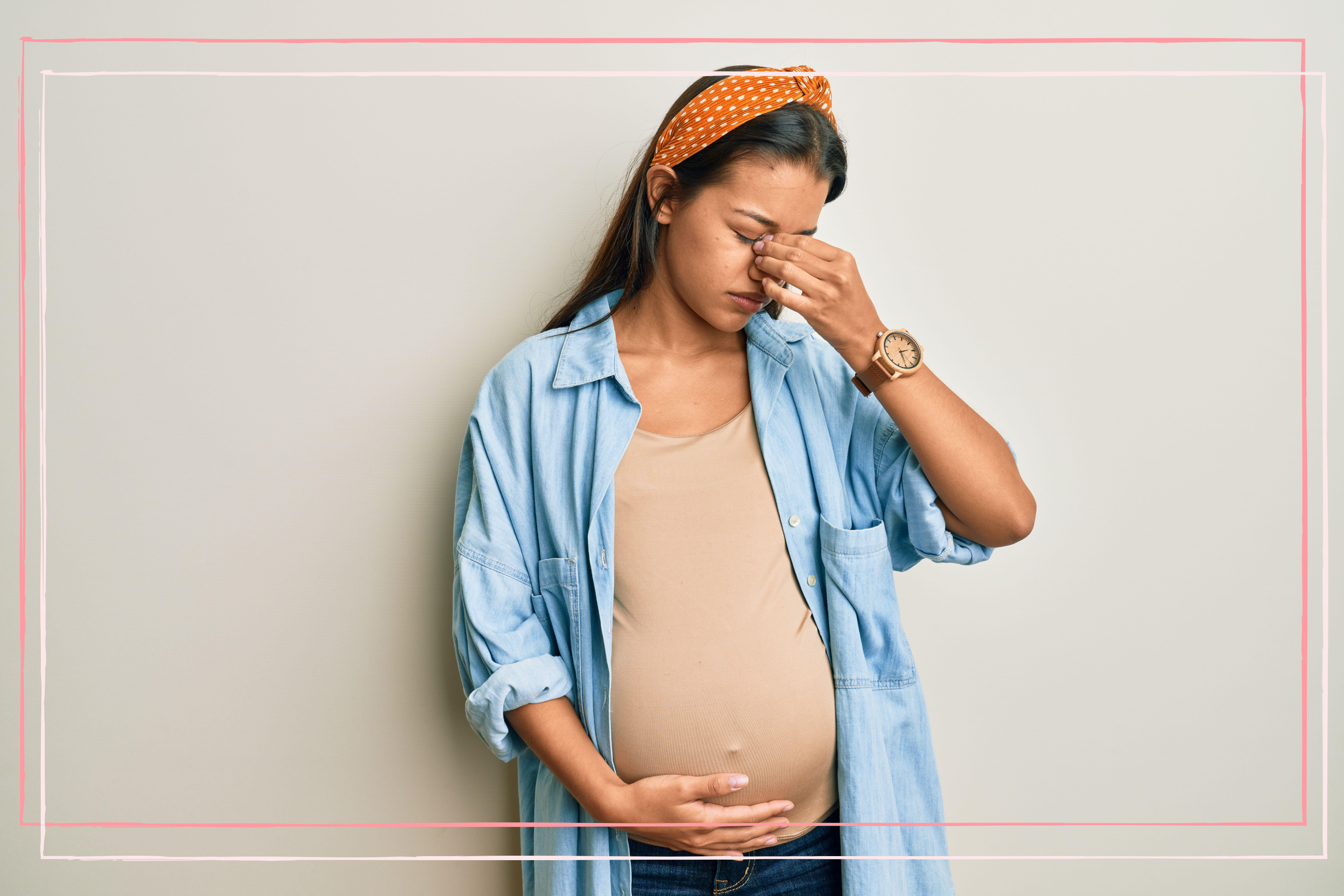
The mental and physical changes you go through during pregnancy can feel quite overwhelming. Almost every part of your body will be affected by hormonal fluctuations and the impact of your growing baby during the nine months, and for many women this includes their eyes and vision.
Many of the symptoms experienced during pregnancy should ease and eventually stop after your baby is born but it’s important to know which ones are normal and which ones you should seek some medical advice about. Fiona Gibb, director of professional midwifery at the Royal College of Midwives, tells Good To Know: “Eye issues during pregnancy are common and are usually a result of hormonal changes, however we would always encourage reporting any eye symptoms, including blurred vision, flashing lights or any visual disturbances to your midwife or obstetrician.”
We’ll take a closer look at all of the symptoms in this article and discuss what can be done to ease them or prevent them.
6 common eye issues during pregnancy
Pregnancy affects every woman differently and some people may not be troubled by eye problems at all. However, the changes to your metabolism, hormones, fluid retention and cardiovascular system mean it’s very normal for issues with your eyes and vision to arise. Below are some of the most common issues women experience.
1. Dry eyes
During your pregnancy, hormonal changes may mean that your body produces less tear fluid which can lead to dry eyes. This 2014 study states that this dryness is due to the higher levels of oestrogen and progesterone. As well as feeling dry, your eyes might also feel itchy, look red or have a burning sensation.
Dry eyes can be especially annoying if you wear contact lenses. However, opticians or pharmacists will be able to recommend eye drops which can ease the dryness and help keep your eyes hydrated. It may also help to take regular screen breaks and make sure you’re getting enough sleep.
2. Blurred vision
Blurred vision is another common eye problem during pregnancy. It’s caused when fluid retention temporarily changes the shape of your cornea (the outer layer of your eye which covers your iris and pupil). This can affect how light travels into your eye which is what causes the blurriness.
Parenting advice, hot topics, best buys and family finance tips delivered straight to your inbox.
If the blurriness is causing issues with driving, work or reading then an optician may be able to give you a supply of different contact lenses or some temporary corrective glasses. Using eye drops and making sure your eyes don’t get overtired can help with blurred vision. It’s best to speak to your optician before you change your glasses or contact lens prescription because it’s likely that your eyes will return to normal once your baby is born.
Midwife Lizzie Zahoranksa-Earle, who runs antenatal classes for professionals and parents-to-be at Antenatal Training International, says blurred vision can also be associated with more serious pregnancy conditions such as gestational diabetes, high blood pressure and pre-eclampsia. “Your midwife will refer you for blood tests if your blood pressure is higher than normal (although it is normal to fluctuate through pregnancy anyway), but if you have any symptoms you do need to see someone straight away,” she says. We will discuss these more serious health conditions below.
3. Twitching
Eye twitching, also known as myokymia, is probably something you’ve also experienced when you’re not pregnant. It can happen when you’re tired or stressed or have had too much caffeine. It can affect both your upper and lower eyelids and while it’s not painful, it can be irritating. If you’re suffering from pregnancy insomnia you might find that your eyes feel very tired which may lead to twitching.
The NHS says that a deficiency in vitamin B12 and magnesium can also cause eye problems such as twitching so make sure you’re eating a balanced diet rich in protein like chicken and salmon, green leafy vegetables, bananas and avocado. If you’re experiencing severe twitching and vision problems, pain or your eyelids are drooping, contact your doctor as it could be a sign of something more serious.
4. Light sensitivity
GP Dr Deepali Misra-Sharp says: “Increased sensitivity to light (photophobia) can occur due to migraines (which can also be triggered by hormonal changes) or changes in the eyes’ function.” Warm compresses and eye drops may help ease
Light sensitivity is another common symptom in pregnancy, but if it’s accompanied by other symptoms such as swelling of your face and legs and a headache it could be a sign that you have preeclampsia. Speak to your doctor immediately or contact the maternity unit at your local hospital.
5. Puffy eyelids
Ophthalmologist Dr Samal Hamada, who works at Eye Clinic London, writes in this blog post that salt and water retention and fluctuating hormones can cause puffiness in your eyelids and around your eyes. While it can be frustrating and might make you feel more tired, it should not be painful. However, if you’re experiencing a severe headache along with the puffiness you should speak to your doctor immediately as it could be a symptom of pre-eclampsia.
Dr Hamada says staying hydrated, avoiding foods high in salt and a cold compress over your eyelids can all help ease this symptom.
6. Pigmentation
During pregnancy patches of skin on the face can become darker than others, including around the eyes. This is called melasma or chloasma, but it is reversible and should fade after the pregnancy. This study says that hormonal changes can lead to an increase in melanin, which is the substance that creates hair, eye and skin pigmentation. Wearing suncream and a hat can help prevent this pregnancy symptom, which is sometimes called the ‘mask of pregnancy’.
4 pregnancy health conditions that can affect vision
There are some more serious pregnancy-related health conditions which can affect your vision which you should be aware of. Your midwife will check for these during your routine antenatal appointments to make sure they’re treated properly and promptly. It’s very rare for any long term damage to be done to your eyes from these health conditions but we’ve outlined them below.
1. Hormonal changes
As we’ve mentioned above, changes in your oestrogen and progesterone levels during pregnancy can lead to changes in your tear production and corneal shape which can affect your eyes and vision. Fluctuating hormone levels can lead to dry eyes which can be uncomfortable but there are treatments that can help as we outlined above.
Higher levels of oestrogen can soften the cornea which may affect how light travels into your eyes. The change in light refraction can cause blurry vision and the dryness can make wearing contact lenses uncomfortable but again, treatment for this is available from pharmacies.
2. Gestational Diabetes
Gestational diabetes is high blood sugar which develops in some women during pregnancy but usually goes away when your baby is born. Women who are overweight or aged over 40 are more at risk and it usually begins in the second or third trimester. You may not know you have it which is why you will be offered a blood test (oral glucose tolerance test) if you have any of the risk factors.
If gestational diabetes has not been detected, some women may develop other symptoms and one of these relates to the eyes. Dr Misra-Sharp explains that high blood sugar “can lead to blurred vision due to blood sugar fluctuations affecting the eye lens”.
Women with gestational diabetes will be given a blood sugar testing kit and will be advised to amend their diet. They will be monitored closely and may be offered insulin tablets or injections if necessary.
Zahoranska-Earle explains more about diabetes and eyesight: “Diabetes causes retinopathy, which is basically the high levels of sugars causing damage to the retina, which over a prolonged period of time can cause bleeding blockages within the eye circulation. However pregnancy is not usually long enough in duration to cause damage in this way, plus gestational diabetes is usually caught and treated and managed very effectively”
3. Pre-eclampsia
One of the reasons your midwife will ask you to pee in a pot at every antenatal appointment is to check for protein in your urine. Protein is one of the early signs of pre-eclampsia, along with high blood pressure.
Pre-eclampsia is a dangerous condition which can lead to serious complications for both mum and baby and is most likely to happen in the second half of your pregnancy. While you may not know if you have protein in your pee or high blood pressure, you will notice if you start to get bad headaches, sudden swelling of your face, hands and feet and vision problems. Dr Misra-Sharp says these vision problems include blurred vision, the presence of flashing lights, vision loss and light sensitivity.
If you’re experiencing any of these you should seek medical attention immediately.
The NHS says people with the following conditions may be at higher risk of pre-eclampsia:
- Diabetes, high blood pressure or kidney disease before you were pregnant
- Autoimmune conditions such as lupus
- Pre-eclampsia in a previous pregnancy
- A family history of pre-eclampsia
- Aged 40 or over
- A BMI of 35 or more
- Expecting twins or triplets
4. Migraines
If you are familiar with migraines and their symptoms you will be aware that as well as a headache, they can also affect your eyesight. This is called aura and may include seeing zigzag lines or flashing lights. For many people aura is the first sign you’re going to have a migraine. Dr Misra-Sharp says migraines can also cause light sensitivity.
If you do suffer from migraines, you might be worried about whether this will affect you during your pregnancy too. The good news from the Migraine Trust is that many women experience fewer migraines during the second and third trimester of their pregnancies. The trust says: “This improvement may be due to the increased oestrogen levels and increased levels of natural pain-killing hormones (endorphins).” Unfortunately, this does mean that when your hormones settle back down to normal after the birth, your migraines may return, especially if you’re not breastfeeding.
The situation will be different for everyone and some women may experience migraines throughout their pregnancy, while others may not have any.
If you are planning to get pregnant and take regular medication for your migraines, you should speak to your doctor first. Some of the prescribed medicines are not safe to take while pregnant or breastfeeding.
When to seek medical advice?
When you’re pregnant it’s always best to play it safe and seek medical attention if anything worries you. Your GP and midwife would always rather you tell them about any symptoms which are worrying you. When it comes to your eyesight, Dr Misra-Sharp says you should seek medical advice if it suddenly deteriorates or changes, for example with blurring, flashes or loss of vision.
If you have any symptoms of pre-eclampsia such as sudden swelling of your hands or face, severe headaches or seeing spots then you should immediately call your midwife, GP surgery or NHS 111.
Dr Misra-Sharp says if your “vision changes are accompanied by other symptoms like severe headaches, pain in the eyes, or dizziness” then you should get medical help.
Frequently asked questions
Why am I seeing sparkles in pregnancy?
Seeing sparkles or stars in your vision can be a symptom of preeclampsia and you should seek medical advice immediately. Once your blood pressure is brought under control your vision should start to improve and hopefully no long-term damage will have been done.
Can you suddenly lose vision during pregnancy?
Dr Misra-Sharp says: “While total vision loss is rare, severe complications like pre-eclampsia or retinal detachment in cases of very high blood pressure can lead to significant vision problems. This is why monitoring any significant changes in vision is important.”
What does preeclampsia vision look like?
As we have discussed above, one of the symptoms of pre-eclampsia is changes to your vision. Dr Misra-Sharp says there are a few signs to look out for including; “blurred vision, flashes of light, seeing spots or floaters and loss of peripheral vision (in extreme cases)”. She says these symptoms should be treated as a medical emergency.
We spoke to the following experts

I started my midwifery training in 2009 where I developed a specialisation in childbirth education and perinatal mental health. It was very clear to me that as a childbirth educator I could really make an impact that I couldn’t in any other role. I developed a 6 pillar system to really make a positive impact on a parents journey and now I train other mums and midwives, in my methods through Antenatal Training International. In just 3 years Antenatal Training International trains over 30 NHS trusts and 700 students in 9 different countries and sees parents travel over 2 hours to get to our antenatal classes.

Dr Deepali Misra-Sharp is an experienced General Practitioner with over a decade in NHS practice and also serves as the clinical lead for Women’s health at her NHS practice based in Birmingham . After graduating from the University of Nottingham’s Graduate Medicine Program in 2010, she completed specialist training in Glasgow and earned Fellowship of the Royal College of General Practitioners (FRCGP) for her contributions to General Practice and Women’s Health.

Kat has been a digital journalist for over 15 years after starting her career at Sky News where she covered everything from terror attacks to royal babies and celebrity deaths. She has been working freelance for the last five years and regularly contributes to UK publications including Stylist, ES Best, Woman&Home, Metro and more.
